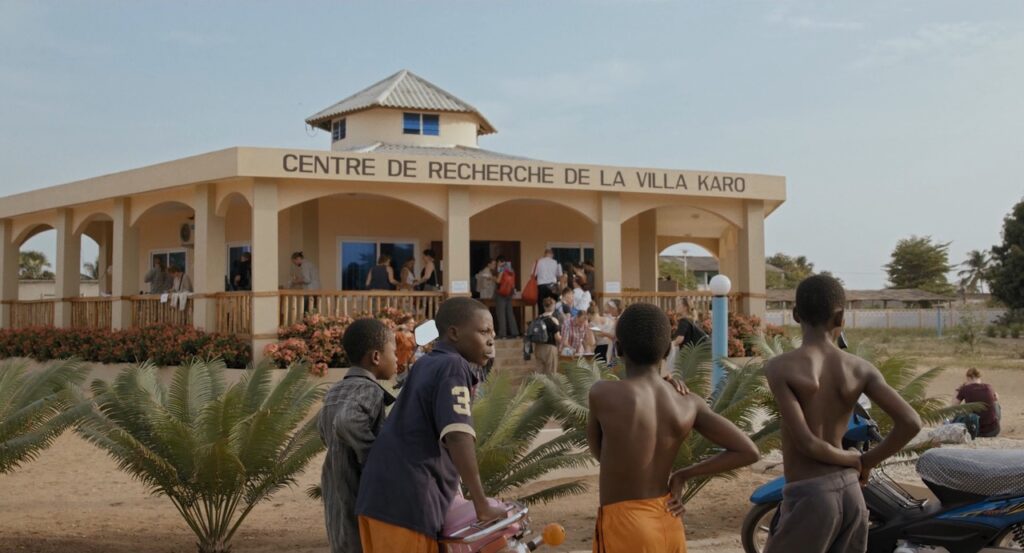Director and writer Mia Halme has a background in journalism. Her documentaries have been screened in various festivals around the world. “Forever Yours” (2012) was awarded the prestigious Jussi Award at Finland’s premier film industry event and won Best Direction at Visions du Réel. “Every Other Couple” (2016) premiered at DOK Leipzig and Hot Docs.
“People We Come Across” is screening at the 2021 Hot Docs Canadian International Documentary Film Festival, which takes place April 29-May 9. The fest is digital this year due to COVID-19. Streaming is geo-blocked to Canada.
W&H: Describe the film for us in your own words.
MH: A doctor wants to save the world. She is a hardcore professional but also a passionate visionary who conducts a vaccine study for which over 700 Finnish tourists travel to Benin, West Africa, to be the volunteers. In a small village in Benin, the Finns start to help the locals by purchasing solar panels for their schools, and the Beninese help the Finns in many other ways. They teach them how life can be led despite not having everything you need — they teach them how to laugh and dance and forget the stress for a moment.
“People We Come Across” is a film about the human urge to help and about getting in contact with others in order to have a stronger purpose in your life and to be happier.
W&H: What drew you to this story?
MH: First the craziness of the research setting. So many Finns who travel to Benin to get a light tropical disease and to be examined! What drew me into the story later on were the playful locals and the Finnish team in the lab in Benin, with their passionate but relaxed way of working. And finally, what really drew me into this was the knowledge of super bacteria and what a big global threat this invisible little thing is, and how we can fight it by reducing the unnecessary use of antibiotics.
W&H: What do you want people to think about after they watch the film?
MH: I would love them to feel hopeful. I would really love them to feel connected to the people in Benin, people they don’t know but they could recognize — I would like them to think that we are the same everywhere.
And on a more serious note, I would love them to think: How could we all avoid using unnecessary antibiotics in order to slow down the spreading of antibiotic-resistant bacteria?
W&H: What was the biggest challenge in making the film?
MH: The biggest challenge was to tell a story with many layers: the storylines of the scientific study, the arc of helping and the culture clashes, and the development of the main character during the film.
W&H: How did you get your film funded? Share some insights into how you got the film made.
MH: I was happy to have the best Finnish partners to finance a documentary on board: Finnish Film Foundation, Finnish Broadcasting Company, and The Promotion Centre for Audiovisual Culture.
W&H: What inspired you to become a filmmaker?
MH: I want to understand the unsolved mystery of life with its layers of feelings, fascinating biology, and the spiral of time we live in.
W&H: What’s the best and worst advice you’ve received?
MH: The best advice I got was from my daughter when she was four years old. She dreamed that we could have a door in our chest that could be opened to ask, “How do you feel, heart?” I took that as advice and I try to ask the question every now and then.
The worst advice is the request “to make a right decision.”
W&H: What advice do you have for other women directors?
MH: Live your own life and tell your own stories in your own way. Don’t think about the big audience. As a producer or director or teacher, be a mentor for other women and hire them for your productions.
W&H: Name your favorite woman-directed film and why.
MH: This is too hard because there are so many. Agnès Varda is one of my early favorites with her light associative style, and so is Jane Campion for her ability to represent repressed feelings. My favorite documentary film right now is “Cameraperson” by Kirsten Johnson. Her way of using images is really brave and her boldness in storytelling without leaning into traditional story structure is enviable.
W&H: How are you adjusting to life during the COVID-19 pandemic? Are you keeping creative, and if so, how?
MH: I feel creative and am working on my next film. In silence it’s easier to concentrate and to take time to dwell in my thoughts, but I admit that I miss the energy I get from good collaborations with my colleagues.
W&H: The film industry has a long history of underrepresenting people of color onscreen and behind the scenes and reinforcing — and creating — negative stereotypes. What actions do you think need to be taken to make Hollywood and/or the doc world more inclusive?
MH: Money brings power (maybe not happiness). The industry should hire more people of color in every field and on every level of the film industry. Also, film schools should educate more people of color.







